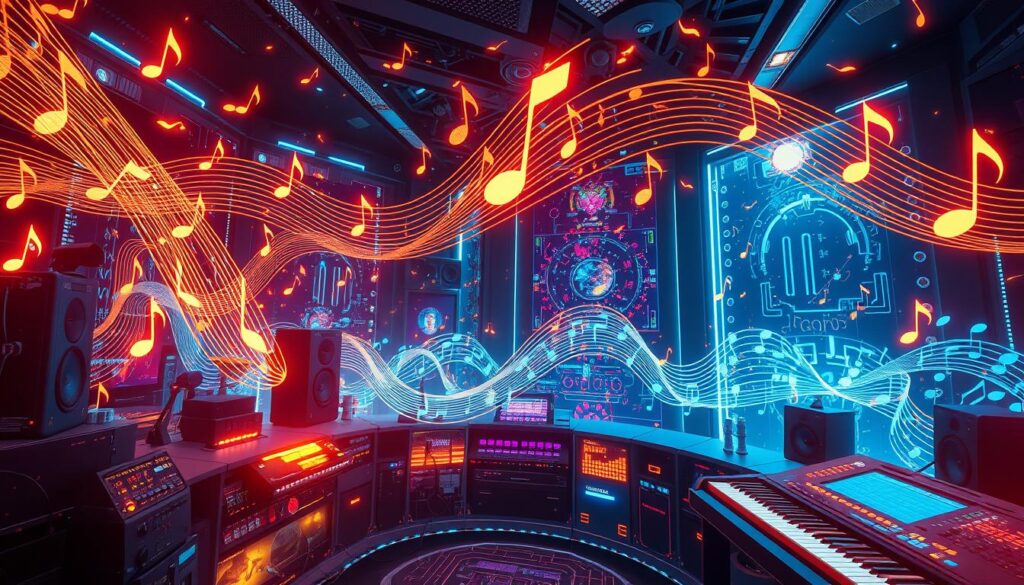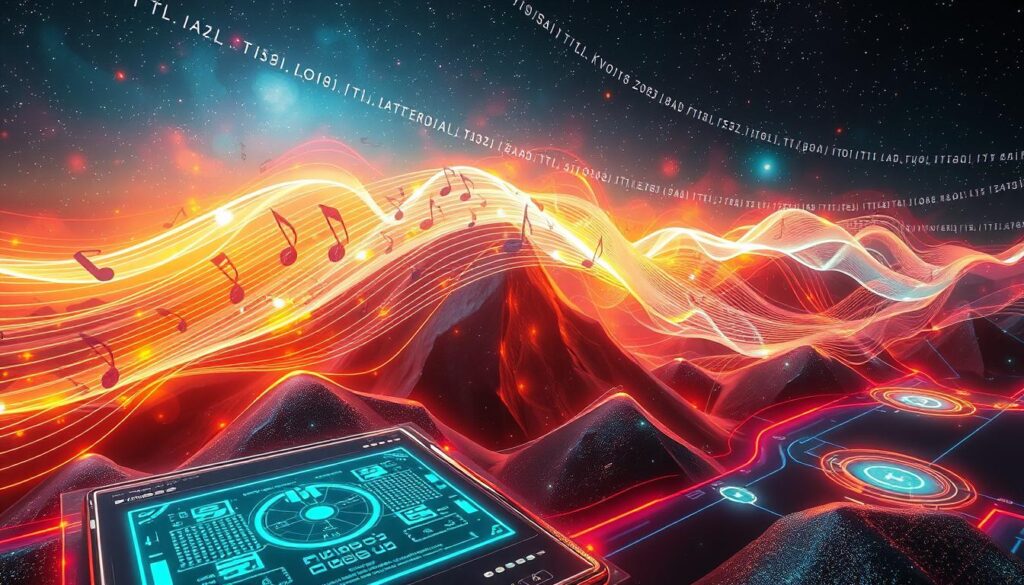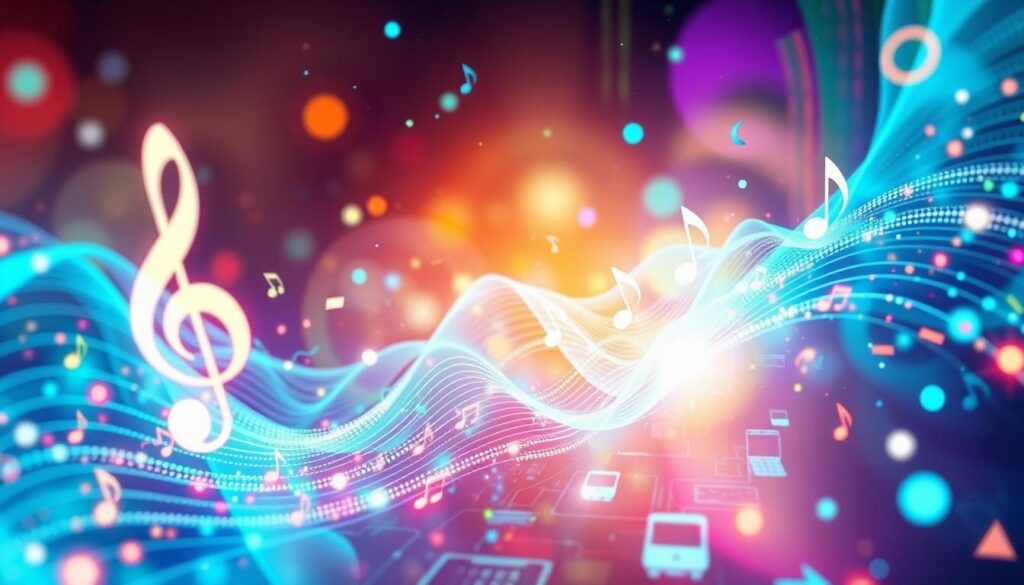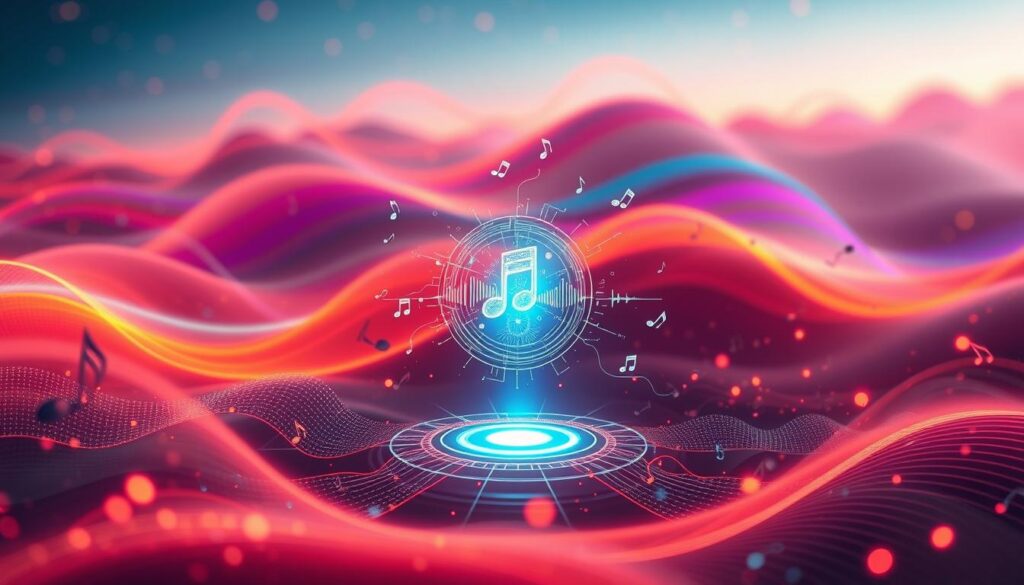“The future belongs to those who believe in the beauty of their dreams.” – Eleanor Roosevelt. This quote resonates deeply in the realm of AI music creation, sparking curiosity about whether tools like ChatGPT can compose music.
ChatGPT, developed by OpenAI and launched in November 2022, is a state-of-the-art language model based on GPT-3.5. It’s designed to engage with users through conversation and respond to various prompts. As its capabilities extend into chatgpt music generation, a discussion among musicians and enthusiasts has begun: can ChatGPT create music? This inquiry highlights the intersection of technology and art, allowing individuals to explore new musical dimensions based on specific inputs.
Investigations show that ChatGPT can craft melodies and generate lyrics, but its success depends on user direction1. Users have successfully created elements like guitar tabs, chord progressions, and even complex musical structures1. The tool excels at producing coherent compositions when given precise guidelines regarding beat, key, and melody characteristics12. Yet, it faces limitations in transcribing audio files into MIDI or sheet music, raising questions about its full potential in music composition2. As individuals continue to experiment and push boundaries, the question remains: how far can AI like ChatGPT go in shaping the soundscape of tomorrow?
Key Takeaways
- ChatGPT is capable of generating music, including lyrics and melodies.
- Clear instructions are vital for effective chatgpt music generation.
- Users have achieved success in creating various music-related outputs.
- Limitations exist, notably in transcribing audio to MIDI format.
- The AI’s performance can vary based on the complexity of prompts given.
Introduction to ChatGPT and Music Creation

Since its release in November 2022, ChatGPT has become a key player in the field of ai music composition. This advanced model, based on the GPT-3.5 architecture, showcases remarkable natural language processing abilities. It’s estimated that about 20% of artists are now using AI music composition tools, with the market expected to hit $1.10 billion by 20273. A standout feature of chatgpt music composition is its versatility across genres, from jazz to pop3.
Users can input specific prompts to generate lyrics and melody ideas, greatly boosting the creative process4.
AI tools like ChatGPT also enable musicians to predict trends and consumer behaviors, crucial for crafting effective music marketing campaigns. It’s essential for artists to prioritize data security, transparency, and user consent when using these technologies for music creation3. The fusion of AI and music offers new creative possibilities but also brings challenges. Artists must navigate the integration of technology with traditional music-making practices.
Understanding AI Music Generation
AI music generation is a groundbreaking shift in music creation. Pioneers like Lejaren Hiller and Leonard Isaacson began using computers for music composition in the 1950s5. Today, AI’s role in music is expanding rapidly, showcasing its influence and capabilities6. ChatGPT, a leading chatgpt music maker, can create lyrics and entire songs6. The use of neural networks, like Recurrent Neural Networks (RNNs) and Long Short-Term Memory (LSTM) networks, is key for music processing and generation5.
AI tools, such as Google’s Magenta project and OpenAI’s MuseNet, demonstrate AI’s potential in music creation5. ChatGPT can assist in creating beats, melodies, and songs, making it a valuable tool in music production6. These AI models can learn musical patterns, leading to innovative and creative outputs. This can boost an artist’s visibility and engagement in the digital music world6.
Capabilities of ChatGPT in Music Composition

ChatGPT has revolutionized music composition, empowering users to create music with ease. This AI tool caters to musicians of all levels, from crafting lyrics to melodies and chord progressions. It allows users to explore different styles and concepts, leading to a wide range of creative outputs.
Generating Lyrics and Song Ideas
ChatGPT stands out for its ability to generate lyrics and song ideas based on user prompts. Users can input themes or emotions, and the AI creates lyrical content that may resonate with many. This is a boon for songwriters facing creative blocks or seeking new ideas. Yet, while the AI’s output is often innovative, it can sometimes be clichéd, as seen in some examples7.
Creating Melodies and Chord Progressions
ChatGPT also excels in creating melodies and chord progressions for various musical styles. Users can specify their preferences, such as musical keys or genres, to receive chord progressions that match their vision. It has shown versatility by blending styles and adapting existing works, supporting artistic intentions while offering creative assistance8. The AI’s ability to adjust chords and melodies for genres like R&B and jazz showcases its flexibility in music generation7.
Can ChatGPT create music? A Deep Dive

ChatGPT, launched at the end of 2022, has quickly become a hot topic in music creation circles. This AI model, powered by a massive 570 GB text dataset, excels in generating content like lyrics and melodies9. Many artists and songwriters are curious about its music creation capabilities, using it for everything from song ideas to full compositions9.
The use of ChatGPT in music is on the rise, with musicians tapping into AI for creative exploration. By using ChatGPT to create lyrics and melody outlines, artists can boost their songwriting skills10. The structured prompts help refine outputs, unlocking new creative possibilities.
Musicians find ChatGPT useful for various tasks, like mimicking famous artists, sparking new ideas, and analyzing favorite songs. This collaboration between human creativity and AI output can significantly enhance music creation9. With the advent of tools like OpenAI Jukebox, the potential for songwriters using ChatGPT is vast.
ChatGPT is proving to be an invaluable resource in the music creation process, Illustrating the integration of technology and artistry.
The Role of Specificity in Music Generation

Specificity is crucial in chatgpt music composition and greatly improves ai music creation outcomes. Detailed prompts about musical structure, genre, and instrumentation significantly shape the AI’s output. This mirrors the effectiveness of finding specific items in a cluttered space; clarity leads to better results.
Clear expectations lead to more relevant and coherent outputs from ChatGPT. The AI excels in generating lyrics, chord progressions, and song structures with precise prompts. Those who understand music composition know that specificity is key to achieving creative satisfaction.
As technology advances, ai music creation is becoming more accessible, opening up creative possibilities for everyone. ChatGPT serves as a collaborative tool, helping musicians refine their ideas. This understanding of specificity enhances interactions with AI and empowers users to explore their artistic journeys more effectively, leading to music innovation111213.
Tools and Prompts for Effective Use of ChatGPT
Mastering ChatGPT as a music maker involves understanding its prompts and tools. Song titles and themes are key to tailoring AI responses. They provide context, enhancing the AI’s output quality.
Using Song Titles and Themes
Using specific song titles in prompts allows ChatGPT to access related genres and styles. This results in more meaningful lyrics and melodies. Musicians can explore various concepts, boosting creativity.
Prompts are designed for different tasks, like generating lyrics or suggesting chord progressions. They aid in the songwriting process14. The ability to brainstorm and overcome creative blocks is crucial, inspiring new musical expressions14.
Instructing ChatGPT for Desired Output
Clear instructions to ChatGPT lead to precise outputs that meet user expectations. Specifying chord progressions or lyrical themes helps create engaging music15. Musicians can innovate and add uniqueness to their work.
ChatGPT’s tools support various genres, ensuring versatility in music creation16.
ChatGPT’s advanced AI capabilities are increasingly recognized, affirming its role in music composition. The outlined prompts are valuable for musicians aiming to enhance their creative processes and produce impactful music15.
Limitations of ChatGPT in Music Generation
ChatGPT’s innovative approach in ai music creation faces significant hurdles. Researchers used it to create a pop song in The Beatles’ style, showcasing its potential but also its simplicity compared to human creativity17. The lyrics it produces often lack the emotional depth and personal touch found in songs by human songwriters. This has raised concerns from artists like Nick Cave17. The main reason for this limitation is that only a small fraction of AI Language Models are trained on audio data18, limiting their music generation capabilities.
The AI can create songs that sound like existing ones, leading to legal issues in the music industry17. Future advancements in AI are expected to create systems that understand user preferences and generate personalized music by 202418. Yet, the current ChatGPT may not meet these expectations. The need for human musicianship in music creation is clear, highlighting the importance of integrating human creativity to overcome ChatGPT’s limitations.
ChatGPT as a Music Analysis Tool
In the world of ai music creation, ChatGPT goes beyond simple composition. It acts as a powerful music analysis tool. Users can break down and assess different aspects like lyrics, melodies, and song structures. This helps them understand chatgpt music composition on a deeper level. Musicians can use it to create summaries and comparisons, gaining insights into how to improve their craft.
This technology is a game-changer for songwriters. It helps them grasp the core elements of music creation. For example, ChatGPT offers suggestions for enhancing lyrics or creating catchy melodies when given specific prompts. This analytical tool not only refines compositions but also opens doors to new techniques and styles.
ChatGPT excels in spotting patterns, making it a crucial tool for artists. It helps them understand what audiences like and what’s trending in the music world. As the music scene changes, using such tools can lead to groundbreaking results in both personal and commercial projects. By integrating ChatGPT into their workflow, musicians can tackle challenges like originality and emotional depth in their music192021.
User Experiences with ChatGPT Music Generation
Feedback on chatgpt music generation shows a mix of highs and lows. Many have found it helpful for generating song titles and brainstorming lyrics. It brings out creative ideas that might not have been thought of19. Artists across various genres have found inspiration in using ChatGPT to create music22.
Some users have even generated full instrumentation, showcasing the tool’s versatility22.
Success Stories in Music Creation
Artists have shared their positive experiences with ChatGPT. It has helped them create chord progressions and enhance their music. Musicians have used AI to explore different styles, like jazz and country rock, with great success20.
This has allowed them to streamline their creative process and expand their artistic horizons with confidence.
Challenges Faced by Users
Despite the successes, there are challenges with chatgpt music generation. Some artists are disappointed when AI melodies don’t live up to their expectations. These melodies often lack the quality and nuance of human compositions20.
There are also concerns about AI’s impact on the music industry, including job loss and ethical issues22. This highlights the need for clear, precise prompts to get the most out of ChatGPT in music creation. It helps users work around its limitations and tap into its potential.
The Future of AI in Music Creation
The future of AI in music creation is set for a major shift with new tech advancements. The launch of ChatGPT by OpenAI in November 2022 has marked a significant milestone. It has become a crucial tool for creators aiming to elevate their music projects23. Tools like LyricStudio are already helping artists craft songs, showcasing AI’s ability to create lyrics that reflect a musician’s style23. This development has, though, raised questions about the authenticity and ownership of music.
Generative AI systems are gaining traction, allowing songwriters to create full tracks in seconds and achieve high-quality sound24. The speed at which AI generates music can, though, overwhelm listeners. This makes it hard for new artists to stand out in a sea of AI-created content24. Platforms like PlaylistAI show AI’s potential in creating personalized playlists for services like Spotify and Apple Music23.
Despite these advancements, the music industry faces significant challenges. AI-generated music cannot be copyrighted due to the lack of human authorship, posing legal issues for artists23. It’s crucial to use AI responsibly to ensure artists’ rights are protected while benefiting from new tools. Programs like Reprtoir, which optimize royalty accounting and manage catalogs, underscore the need for balance in this evolving field23.
The evolution of chatgpt music composition opens up new avenues for creativity and efficiency. It empowers producers to explore vocal diversity, previously restricted by budget constraints24. The synergy between human creativity and AI capabilities is shaping the future of music creation. It promises to bring about richer and more diverse artistic expressions.
Alternatives to ChatGPT for Music Composition
In the ever-changing world of music composition, several alternatives to ChatGPT stand out. These tools, like AIVA and Soundful, excel in specific areas such as melody creation and sound synthesis. They cater to various user needs, making them valuable in the music industry. The global AI in music market is expected to grow significantly, reaching USD 38.7 billion by 2033. This growth is driven by a compound annual growth rate (CAGR) of 25.8% from 2024 to 203325.
Platforms like Suno and SongR are designed for non-musicians, offering free plans. This makes chatgpt music maker features accessible to everyone, regardless of their musical background26. AIVA and SOUNDRAW also offer unique features, such as tailored compositions and custom music generation. These tools provide a range of options to fit different creative needs.
When looking for alternatives, it’s important to consider user-friendly interfaces and adjustable settings. Professional audio standards and regular updates are also key factors. Fadr’s music remixing capabilities, with a similarity rate of at most 40%26, highlight the varied functionalities available.
The right AI music generator depends on the musician’s specific needs. Whether it’s unique sounds, faster production, or legal music licensing, there are tools like Muzaic.studio and Remusic that cater to these needs. These platforms showcase the potential for innovation in music composition2527.
Use Cases for ChatGPT in Music Creation
ChatGPT showcases its versatility in music creation, offering a range of applications. Musicians can leverage it to generate song lyrics, sparking their creativity. The music industry’s growing acceptance of AI highlights the potential for human producers and ChatGPT to collaborate. ChatGPT’s ability to outline themes and structures significantly enhances the early stages of composition28.
Its text output capabilities are invaluable, aiding artists in crafting promotional materials and marketing strategies29. Aspiring musicians often face a sea of online resources, making tools like ChatGPT crucial for streamlining their workflow. ChatGPT not only assists in the technical aspects of music creation but also fosters the DIY ethos in the electronic music scene28.
Artists can use ChatGPT to explore ideas in various genres, such as Acid Trance and Gabber Techno, showcasing its adaptability28. The collaboration with ChatGPT can transform the music production workflow. The program’s suggestions can guide the producer’s manual input, fostering creativity while preserving personal touch in the final product. This partnership sparks discussions about the future of human-AI collaboration in music creation29.
Conclusion
The exploration of whether ChatGPT can create music reveals a nuanced understanding of AI music creation and its potentials. ChatGPT can generate lyrics, melodies, and even provide technical support for troubleshooting music production software like Pro Tools and Ableton Live. Its effectiveness, though, heavily relies on user input and clarity. For instance, it can assist in developing chord progressions and analyzing various aspects of a song, demonstrating a solid grasp of music theory and composition techniques3031.
As the technology behind AI continues to advance, the role of tools like ChatGPT in music composition is expected to evolve. This will provide musicians with new and innovative ways to enhance their creative processes. Opportunities for collaboration between human musicians and AI are both exciting and limitless. This suggests a future where artists can leverage AI as a creative partner. In summary, while the question remains, can ChatGPT create music?, it undoubtedly offers valuable resources for musicians seeking to expand their capabilities30.
For those looking to explore how ChatGPT can benefit music production, this resource offers practical insights: explore the article for ways to enhance your music-making.
FAQ
Can ChatGPT create music?
How does ChatGPT assist in music composition?
What are the limitations of ChatGPT in music generation?
How can I improve the results from ChatGPT when creating music?
Can ChatGPT analyze music and provide insights?
What are some practical use cases for using ChatGPT in music creation?
What should I consider when using ChatGPT for creating music?
Are there alternative tools for music composition that I should know about?
What is the future of AI in music creation?
Source Links
- Got ChatGPT to make Music 🎶
- ChatGPT shows us how to make music with ChatGPT
- Utilizing ChatGPT for Music Production: A Step-by-Step Guide
- Lesson №8: “Creating Music with ChatGPT”: An Overview of the Capabilities of ChatGPT and AI | BotHub
- AI Music Generation | CottGroup®
- ChatGPT in the music industry: songwriting and production automation
- ChatGPT and Music: Use in Composition and Songwriting
- ChatGPT (GPT-4) music composition experiments
- The Potential of ChatGPT in Music: A Guide to AI-Assisted Music Composition and Analysis
- How to Use ChatGPT to Compose a Song –
- ChatGPT and the Music Industry: Transforming Songwriting and Production
- A ChatGPT for Music Is Here. Inside Suno, the Startup Changing Everything
- Understanding and Generating Music Intrinsically with LLM
- ChatGPT Prompts to Inspire Musicians
- 29 ChatGPT Prompts for Musical Writers | MusicalWriters.com
- Anyone else using ChatGPT to make music?
- ChatGPT and the Dangers for Songwriting | Tileyard Education
- Can LLMs be used to create unique and original music compositions?
- 5 Ways to use ChatGPT for artists and musicians
- Using ChatGPT as a Creative Writing Partner — Part 2: Music
- AI and music—how is ChatGPT changing the industry?
- MUSICIANS ARE SCR*WED – I tested the ChatGPT for Music, Suno AI Music Generator
- ChatGPT and Music: Is AI the Future of Creativity?
- How AI is Transforming the Future of Music Production | Trends & Insights
- 10 AI Music Generators for Creators in 2024 | DigitalOcean
- 6 AI Music Composition Tools WavTool, Fadr , songR,landr…
- Move Over ChatGPT – Here Comes Claude — Dr. James Frankel
- (Tutorial) How to write music using ChatGPT: Part 1 – Basic details and easy instructions
- What ChatGPT can do for independent music
- How to Use ChatGPT to Improve Your Music Productions — Pro Audio Files
- 11 Practical Uses of ChatGPT in Music Production (with prompts)







